Explosion, Fire At Petrochemical Company In Southern Iran Leave 2 Injured
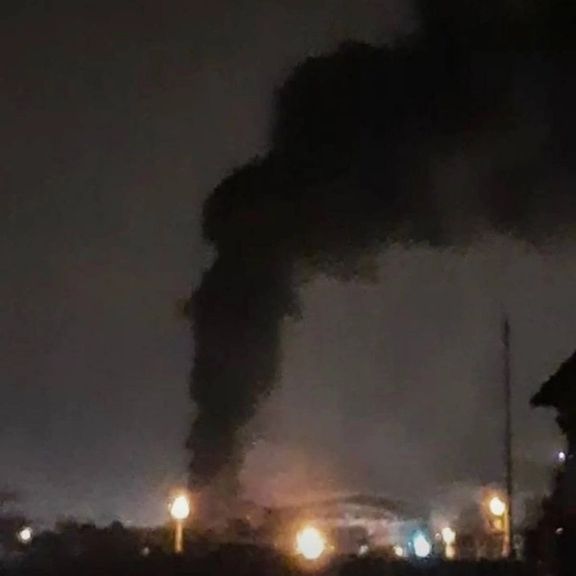
An explosion and a large fire in the Bandar Mahshahr Petrochemical Special Economic Zone in southern Iran have left at least two workers injured.

An explosion and a large fire in the Bandar Mahshahr Petrochemical Special Economic Zone in southern Iran have left at least two workers injured.
The blast and the blaze happened in Kavoshgaran Mahshahr petrochemical plant in the port city of Mahshahr in Khuzestan province in the early hours of Friday.
According to a spokesman of the company, Mohsen Adibi, the fire has been contained and the cause of the accident is being investigated.
The CEO of the economic zone, Omid Shahidinia, said a tanker loading a hydrocarbon product caught fire and it spread to other parts of the plant.
In February, the petrochemical company came under attack reportedly by armed men, who set a big fire to a dozen vehicles.
The public relations manager of the firm, Hamid Danesh, told Fars news at the time that “breaking the windows of the security compound, like in this incident, clashing with the security forces of the company and also theft have been among similar cases in recent months."
There have been many explosions and fires in Iran’s military and industrial sites since mid-2020, with authorities not giving a full explanation in many instances. However, they have blamed Israel for a series of spectacular sabotage attacks on nuclear facilities, including two explosions at Natanz uranium enrichment center.
The oil and gas industries have also experienced many incidents of exploding pipelines and refineries where large fires were reported.

In an unprecedented turn of events, many Iranians are urging FIFA to ban their country from the World Cup for forcibly barring women from a match on Tuesday.
#Fifabaniri (FIFA ban Islamic Republic of Iran) and similar hashtags rose to the top of most used hashtags in Persian-language Twitter after security forces Tuesday violently barred women, who had tickets in their hands, from entering the Imam Reza Stadium in the religious city of Mashhad. To disperse women, they pepper sprayed them.
People from every walk of life, including former and current members of Iran's national team and top football clubs, politicians, the exiled Prince Reza Pahlavi, and many ordinary Iranians are pledging not to go to stadiums as long as women are not allowed to enter.
"As a member of the football family, I apologize to women who were held behind the stadium gates in Mashhad. The kind of football we want spreads a red carpet for its [female fans] and doesn't spray pepper at them, Javad Nekounam, former national team coach, said in an Instagram post Thursday which he appears to have removed later under pressure.
"Women should be able to come to stadiums. We are the only country, apart from Afghanistan, that doesn't allow women to enter stadiums. Why is it so?" Alireza Biranvand, a member of the national team, said in an interview with Tarafdari sports website Thursday.
Masih Alinejad, an Iranian activist and campaigner against forced hijab has taken it on herself to spearhead a campaign to ban Iran from competing in the World Cup later this year.
"I call on FIFA to ban the Islamic Republic because we, the women of Iran, are banned from entering stadium for 42 years," she told Daily Mail Wednesday. She argued that FIFA would have been stricter in enforcing its own regulations if Western countries had banned women from entering stadiums. "This is a total betrayal that FIFA do not take a strong action against a gender apartheid regime!" she said.
For nearly a decade the world’s soccer authority has tried to convince the Iran’s government to lift an unwritten, four-decade-old ban on women attending stadiums to watch male players. Iranian officials argue that male football fans swear profanities so the atmosphere of stadiums is not suitable for women even if they are seated in a different part of the stadium.
"FIFA's position … is clear: historic progress has been achieved – as exemplified by the milestone in October 2019, when thousands of women were allowed into the stadium … and more recently when some women were allowed again at the FIFA world Cup qualifier match in Tehran in January – and FIFA expects this to continue, as there can be no turning back," FIFA said in a statement Wednesday.
The ban has led to arrests, beatings, detentions, and abuses against women. In September 2019, a female football fan, Sahar Khodayari, who came to be known as the “Blue Girl” after her favorite team, Esteghlal FC, was reportedly sentenced to jail for trying to enter a stadium disguised as a man. She died by self-immolation, causing a domestic and international outcry.
“Iranian authorities have repeatedly demonstrated they are willing to go to great lengths to enforce their discriminatory and cruel ban on women attending football stadiums,” said Tara Sepehri Far, senior Iran researcher at Human Rights Watch (HRW). “Given Iranian authorities’ longstanding violations, FIFA needs to follow its own global guidelines on non-discrimination and should consider enforcing penalties for Iran’s noncompliance,” she said.
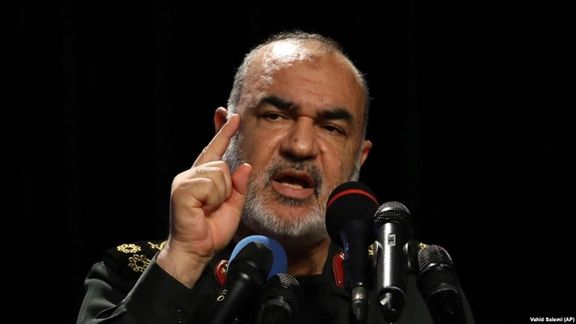
Iran’s Revolutionary Guard says its missile program and its sphere of influence in the countries of the region are the redlines that won’t change.
The Islamic Revolution Guards Corps (IRGC) made the remarks in a statement issued on Thursday, warning that Iran will give a destructive response to the “enemy’s slightest move” against the country.
“Iran’s missile power, popularity, and regional sphere of influence are associated with the IRGC”, the statement said, adding that it “will give categorical and destructive response to even the smallest mistake of the evil and adventurist enemy against the Islamic homeland”.
The terse statement came as one year of talks to restore the 2015 nuclear deal known as JCPOA have reached a deadlock over Iran’s demand for the United States to delist the IRGC as Foreign Terrorist Organization (FTO).
The statement went on to say that Iran never defines its deterrence “according to the aspirations, desires and wishes of the rulers of the White House and their evil allies, and will not change it under their pressure, threat or evil media propaganda.”
Earlier in the day, IRGC commander Major General Hossein Salami also boasted about the the combat power of IRGC forces -- especially those deployed to the country’s key islands in the south -- urging the Persian Gulf littoral states to end their dealings with Israel.
The saber-rattling by the IRGC follows recent media reports that an air defense pact between Israel and friendly regional countries is in the works to confront threats posed by Iranian drones and missiles.
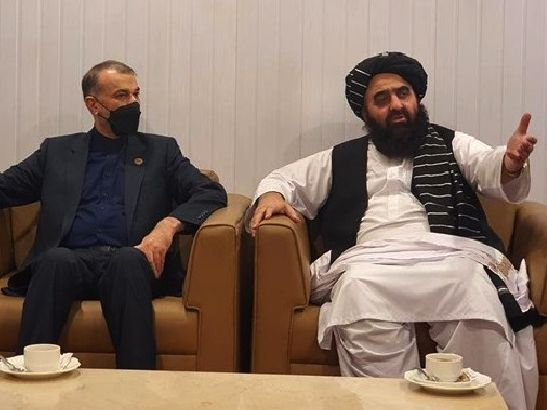
While many express shock by how Iran on Tuesday pepper sprayed women who wanted to watch a football match, its foreign minister has urged the Taliban to respect women’s rights.
Hossein Amir-Abdollahian made his remark during a meeting with his Taliban counterpart Amir Khan Muttaqi in China, on Thursday, where foreign ministers of Afghanistan’s neighboring countries had gathered.
Amir-Abdollahian called for women’s right to education at all levels and their participation in different sectors of the society.
“The role of women in Afghanistan is very important to us... Islam recognizes the presence of women in various fields as their inalienable right,” he said.
In reaction to Amir-Abdollahian’s remarks, senior Israeli diplomat Joshua L. Zarka posted a tweet in Persian, calling it “utmost hypocrisy”. “What do Iranian and Afghan women think about the role you ‘give’ them?”
On Tuesday security forces denied women entry into a stadium in Mashhad to watch a FIFA World Cup qualifier between Iran and Lebanon and used tear gas and pepper spray to disperse them.
Mashhad is home to numerous hardliner clerics who are against women’s presence in male dominated venues. Firebrand representative of the Supreme Leader in the city, Ayatollah Ahmad Alamolhoda has been banning concerts and cultural events for years.
Other than the Taliban regime in Afghanistan, Iran is the only FIFA member country to bar women from football stadiums to watch men’s matches.
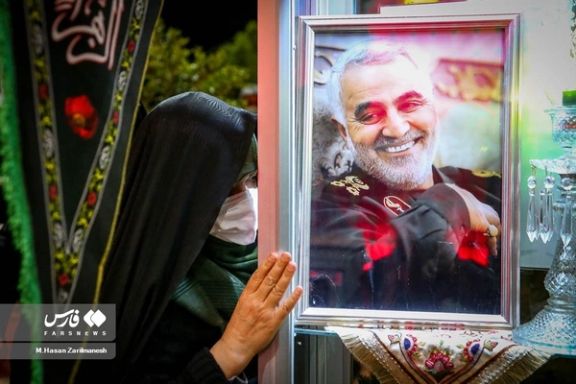
Washington wants Iran to stop threats against US officials for the killing of Ghasem Soleimani if it wants its Revolutionary Guard to be removed from a terrorist list.
The United States will not remove the Revolutionary Guard (IRGC) from its list of Foreign Terrorist Organizations (FTO) unless Tehran pledges to cease its death threats against US officials for the killing of the IRGC's Ghasem Soleimani, a source close to the Vienna talks has told Radio Farda, the Persian service of the US government funded Radio Free Europe.
Iran's Supreme Leader Ali Khamenei, President Ebrahim Raisi, and IRGC officials have repeatedly vowed to avenge Soleimani's death.
“Trump and others like him will be forgotten and lost in the dustbin of history, of course after paying for their crimes in the world," Khamenei said on January 1, two days before the anniversary of Soleimani's killing in Baghdad in January 2020 on former US President Donald Trump's orders.
In a televised speech two days later, Raisi said that "Muslims" would take revenge" if Trump and former Secretary of State Mike Pompeo were not "tried in a fair court for the criminal act of assassinating Soleimani."
The source who spoke on condition of anonymity told Radio Farda that Tehran's last-minute demand for delisting the IRGC is currently the biggest hurdle in the way of an agreement to restore the 2015 Iran nuclear deal, Joint Comprehensive Plan of Action (JCPOA).
Soleimani, who was Iran’s top military and intelligence operator outside its borders, was in charge of supporting and organizing militant proxy forces, including the Lebanese Hezbollah and Iraq Shiite militia groups that have repeatedly attacked US forces.
The European Union's top diplomat Josep Borrel said Monday that talks were stuck by Tehran due to new demands that weren’t part of the JCPOA, such as the status of the IRGC, after a hurdle thrown by Russia was overcome. "It’d be a shame not to reach some sort of an agreement when we're so near to reaching one,” Borrel told the European Parliament
The source also told Radio Farda that the US has asked Iran to pledge that it will not threaten and harm US citizens and facilities in the region.
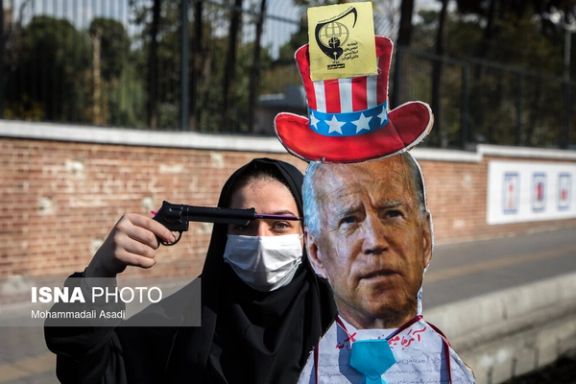
According to Radio Farda's source, Iranian Foreign Minister Hossein Amir-Abdollahian's remarks in an interview Saturday referred to the US condition of not pursuing revenge for Soleimani's killing. "When we say IRGC we mean General Ghasem Soleimani," Amir-Abdollahian said in the interview.
"Regarding the IRGC, what is important is to acknowledge the standing and the central role of the IRGC in our security and defense. [Negotiators] relayed some messages to the US [in this regard]," Amir-Abdollahian said in the same interview.
Trump administration officials have strongly opposed the possibility of the IRGC's delisting. In a joint statement last week, three former senior officials, including former Secretary of State Mike Pompeo, former national security adviser Robert O’Brien, and former director of national intelligence John Ratcliffe said delisting the IRGC would be “a dangerous capitulation" and "a denial of the basic reality that the IRGC's core mission is to spread terror."
“The pursuit of an ill-conceived ‘deal’ should not compel American leaders to acquiesce to the demands of a terrorist regime to deny the truth. American lives are at stake, and this is a time to project strength, not weakness," they said in their statement shared with Axios.
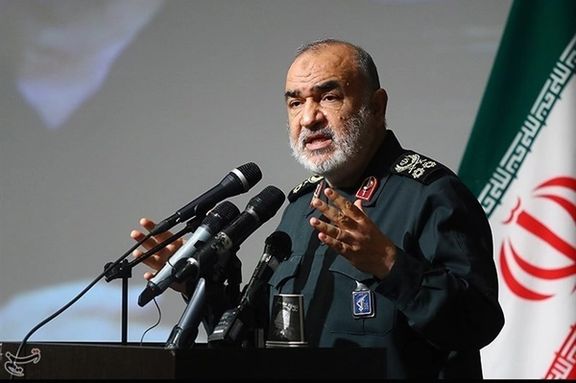
The commander of Iran’s Islamic Revolution Guards Corps (IRGC) has urged states around the Persian Gulf to end their dealings with Israel, alleging that the country’s activities in the region are a cause of insecurity.
“Unfortunately, some countries on the southern side of the Persian Gulf have established political and security relations with [Israel], which poses a serious threat to the security of the region and these states themselves”, Major General Hossein Salami said on Wednesday during a visit to the southern island of Abu Musa, near the strategic Strait of Hormuz.
“We explicitly declare and warn that the continuation of such relations is not acceptable at all,” Salami said, speaking alongside IRCG Navy commander Admiral Alireza Tangsiri.
Salami also praised the combat power of IRGC units, especially those deployed to Iran’s islands in the Persian Gulf, the Strait of Hormuz and the Sea of Oman, as well as the capabilities of the Revolution Guards’ naval forces in the fields of drones, missiles, electronic warfare and submarines, adding that these forces can show timely and effective response to any threats.
The IRCG commander’s comments follow recent media reports that an air defense pact between Israel and friendly regional countries is in the works to confront threats posed by Iranian drones and missiles.
The reports came in the wake of a two-day meeting on March 27-28, dubbed the “Negev Summit”, which brought together the top diplomats of Israel, the United States, and four Sunni Arab states, including the Persian Gulf countries of Bahrain and the United Arab Emirates.
Wrapping-up the landmark gathering in Israel, Israeli foreign minister Yair Lapid announced the participants had decided to make the summit into a “permanent forum” that he said would help confront “our common enemies, first and foremost Iran and its proxies”.